| Listing 1 - 10 of 19 | << page >> |
Sort by
|
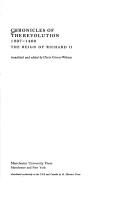
ISBN: 0719035279 Year: 1993 Volume: *2 Publisher: Manchester, UK New York New York Manchester University Press Distributed exclusively in the USA and Canada by St. Martin's Press
Abstract | Keywords | Export | Availability | Bookmark
 Loading...
Loading...Choose an application
- Reference Manager
- EndNote
- RefWorks (Direct export to RefWorks)
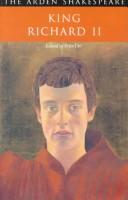
ISBN: 0416475205 9780416475203 Year: 1969 Publisher: London Methuen
Abstract | Keywords | Export | Availability | Bookmark
 Loading...
Loading...Choose an application
- Reference Manager
- EndNote
- RefWorks (Direct export to RefWorks)
Book
ISBN: 041610200X 9780416102000 Year: 1970 Volume: 292 Publisher: London Methuen
Abstract | Keywords | Export | Availability | Bookmark
 Loading...
Loading...Choose an application
- Reference Manager
- EndNote
- RefWorks (Direct export to RefWorks)
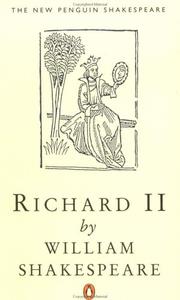
ISBN: 0140707190 9780140707199 Year: 1985 Publisher: London Penguin
Abstract | Keywords | Export | Availability | Bookmark
 Loading...
Loading...Choose an application
- Reference Manager
- EndNote
- RefWorks (Direct export to RefWorks)
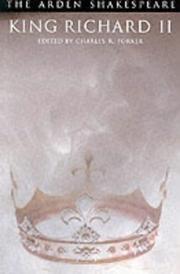
ISBN: 9781903436332 1903436338 190343632X Year: 2002 Publisher: London : Bloomsbury Arden Shakespeare,
Abstract | Keywords | Export | Availability | Bookmark
 Loading...
Loading...Choose an application
- Reference Manager
- EndNote
- RefWorks (Direct export to RefWorks)
Book
ISBN: 0710072287 9780710072283 Year: 1972 Publisher: London
Abstract | Keywords | Export | Availability | Bookmark
 Loading...
Loading...Choose an application
- Reference Manager
- EndNote
- RefWorks (Direct export to RefWorks)
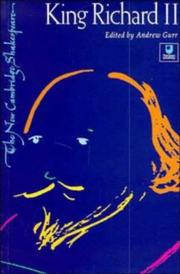
ISBN: 0521230101 0521297656 9780521297653 Year: 1990 Publisher: Cambridge Cambridge university press
Abstract | Keywords | Export | Availability | Bookmark
 Loading...
Loading...Choose an application
- Reference Manager
- EndNote
- RefWorks (Direct export to RefWorks)
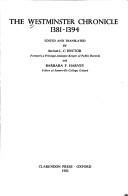
ISBN: 0198222556 9780198222552 Year: 1982 Volume: vol *28 Publisher: Oxford Clarendon
Abstract | Keywords | Export | Availability | Bookmark
 Loading...
Loading...Choose an application
- Reference Manager
- EndNote
- RefWorks (Direct export to RefWorks)
Great Britain --- Grande-Bretagne --- History --- Sources --- Histoire --- 942.03 <093> --- Manuscripts, Medieval --- -Middle ages --- -Dark Ages --- History, Medieval --- Medieval history --- Medieval period --- Middle Ages --- World history, Medieval --- World history --- Civilization, Medieval --- Medievalism --- Renaissance --- Medieval manuscripts --- Manuscripts --- Geschiedenis van Engeland--(1154-1399)--Historische bronnen --- -Sources. --- Sources. --- -Geschiedenis van Engeland--(1154-1399)--Historische bronnen --- 942.03 <093> Geschiedenis van Engeland--(1154-1399)--Historische bronnen --- Richard II, 1377-1399 --- Great Britain - History - Richard II, 1377-1399 - Sources
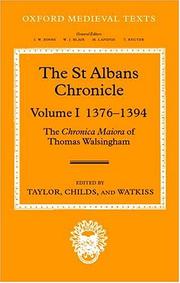
ISBN: 019820471X 9780199253463 9780198204718 0199253463 Year: 2003 Publisher: Oxford New York : Clarendon Press,
Abstract | Keywords | Export | Availability | Bookmark
 Loading...
Loading...Choose an application
- Reference Manager
- EndNote
- RefWorks (Direct export to RefWorks)
Thomas Walsingham, a monk of St Albans, has been described as the last of the great medieval chroniclers. His major work, the Chronica maiora, covers the years 1376-1422, and is arguably the most important account of English history to be written in England at this time. Walsingham's text has never been published as a continuous whole. It is found in no fewer than three separate publications in the Rolls Series, and was printed from manuscripts whose exact identity was not then clearly understood. The nature of the Rolls Series publications, and the different versions of the chronicle have raised questions concerning the relationship of the various manuscripts of the Chronica maiora, and also of Walsingham's own involvement with the text. In this new edition these problems are considered and the Chronica maiora is shown to be predominantly the work of one man, Thomas Walsingham. Volume I of The St Albans Chronicle (1376-1394) contains that part of Walsingham's chronicle which can with some confidence be said to have been written by 1400. With the exception of a brief contemporary continuation (1393-4) the text is taken from BL MS Royal 13 E IX which, although known to the Rolls Series editors, was not used by them as a principal source. During the 1390s the Royal manuscript was extensively revised at St Albans in order to remove criticisms of John of Gaunt. This revision is perhaps the best example of the contemporary rewriting of history in late medieval England. Although Walsingham has traditionally been regarded as the chronicler of the Lancastrian revolution, this part of his chronicle reveals his work as a major source for the Peasants' Revolt, the emergence of John Wyclif, and the political struggles of Richard II's reign. In everything that he wrote, Walsingham was as much a commentator as a recorder, and his absorbing chronicle reveals the manner in which one interested contemporary viewed current events. Volume II of the St Albans Chronicle (1394-1422) now completes the edition. Drawing on the text in Bodley 462 and confirming the work of V. H. Galbraith, the editors make clear that the Annales Ricardi Secundi et Henrici Quarti (regarded in the Rolls Series as a separate chronicle) were an integral part of the Chronica maiora. They also argue that, while Walsingham's contribution as author in the later years was much smaller than in the years to 1393 (when he was without doubt the sole author), it is most likely that he supervised the whole work; and at times, as in the vivid and dramatic descriptions of the battles of Shrewsbury and of Agincourt, his own style is again apparent. The chronicle is of the greatest historical value for Richard II's last years and for his deposition and the accession of Henry IV. It is wholly in favour of the Lancastrian revolution of 1399 and remains 'Lancastrian' in tone to its end. It illustrates (with sympathy) Henry's difficulties in establishing the dynasty and includes unique material on his relations with his son. For Henry V's reign it provides valuable details of his Norman campaigns. Over both reigns St Albans' hatred of Lollardy and its interest in the healing of the Great Schism are apparent in the coverage given them. In the later years, the extent of the commentary on events decreases, but the information available at St Albans and written here continues to be of a high order. The chronicle remains absorbing right to its end.
Great Britain --- Grande-Bretagne --- History --- Sources --- Histoire --- Walsingham, Thomas, --- Henri V, 1413-1422 --- Henry IV, 1399-1413 --- Richard II, 1377-1399 --- Walsingham, Thomas --- Walsingham, Thomas, - fl. 1360-1420. - Chronica Maiora --- Great Britain - History - Henry IV, 1399-1413 - Sources --- Great Britain - History - Henry V, 1413-1422 - Sources --- Great Britain - History - Richard II, 1377-1399 --- 1377-1399 (Richard II) --- Ouvrages avant 1800 --- 1399-1413 (Henri IV) --- 1413-1422 (Henri V)
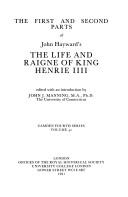
ISBN: 0861931297 9780861931293 Year: 1991 Volume: 42 Publisher: London : Royal historical society - University college London,
Abstract | Keywords | Export | Availability | Bookmark
 Loading...
Loading...Choose an application
- Reference Manager
- EndNote
- RefWorks (Direct export to RefWorks)
Henry --- Richard --- Great Britain --- Grande-Bretagne --- History --- Histoire --- Henry IV, King of England --- -History --- -Henry IV, King of England --- -Henry --- Henry, --- הנרי הרביעי --- Richard II, 1377-1399 --- Richard II --- Henry IV, 1399-1413 --- Henry - IV, - King of England, - 1367-1413. --- Great Britain - History - Henry IV, 1399-1413. --- Grande-bretagne --- Henri iv, roi d'angleterre, 1367-1413 --- 1399-1413 (henri iv) --- Biographie
| Listing 1 - 10 of 19 | << page >> |
Sort by
|

 Search
Search Feedback
Feedback About UniCat
About UniCat  Help
Help News
News